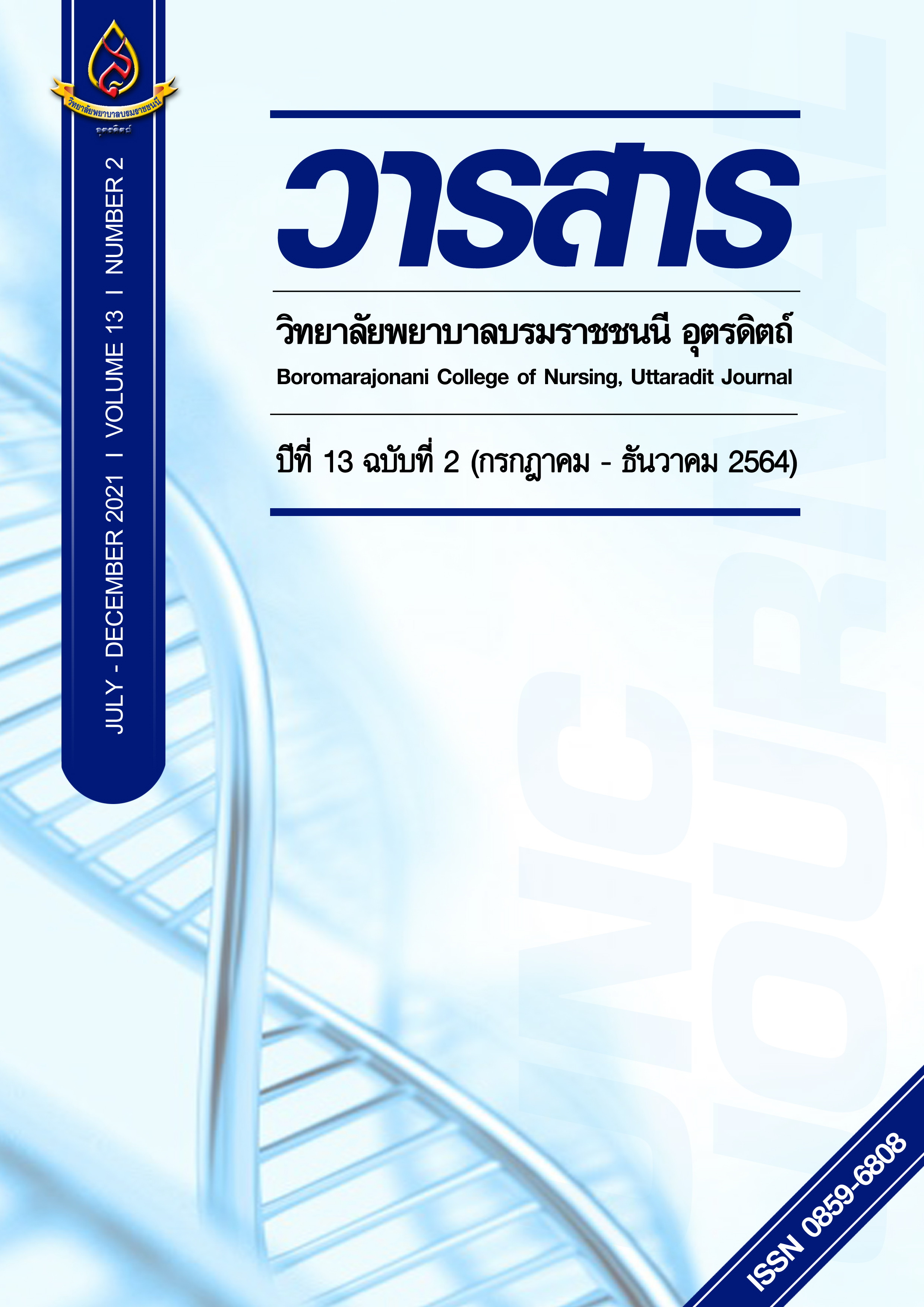องค์ประกอบและตัวบ่งชี้สมรรถนะด้านเทคโนโลยีสารสนเทศของนักศึกษา สถาบันพระบรมราชชนก
Main Article Content
บทคัดย่อ
การวิจัยเชิงปริมาณนี้เพื่อศึกษาองค์ประกอบและตัวบ่งชี้สมรรถนะด้านเทคโนโลยีสารสนเทศของนักศึกษาสถาบันพระบรมราชชนก กลุ่มตัวอย่าง ได้แก่ นักศึกษาที่กำลังศึกษาในระดับปริญญาตรี ปีการศึกษา 2563 ในวิทยาลัยสังกัดสถาบันพระบรมราชชนก จำนวน 820 คน ใช้วิธีสุ่มแบบมีระบบ เครื่องมือที่ใช้เป็นแบบสอบถามสมรรถนะด้านเทคโนโลยีสารสนเทศที่ผู้วิจัยสร้างขึ้น ได้ค่าความตรงระหว่าง .67 – 1.00 และค่าความเชื่อมั่นสัมประสิทธิ์อัลฟาของครอนบาคระหว่าง .878 - .981 เก็บรวบรวมข้อมูลผ่าน Google form วิเคราะห์ข้อมูลโดยการวิเคราะห์องค์ประกอบเชิงสำรวจ (Exploratory Factor Analysis: EFA) สกัดปัจจัยด้วยวิธีวิเคราะห์องค์ประกอบหลักใช้วิธีหมุนแกนองค์ประกอบแบบออโธโกนอลด้วยวิธีแวริแมกซ์ ผลการวิจัยพบว่า
สมรรถนะด้านเทคโนโลยีสารสนเทศของนักศึกษาสถาบันพระบรมราชชนก ประกอบด้วย 7 องค์ประกอบ 76 ตัวบ่งชี้ สามารถร่วมกันอธิบายความแปรปรวนของตัวบ่งชี้ ได้ร้อยละ 67.208 ได้แก่ สมรรถนะด้านกฎหมายและจริยธรรม มี 15 ตัวบ่งชี้ สมรรถนะด้านการใช้เทคโนโลยีสารสนเทศเพื่อการเรียน มี 23 ตัวบ่งชี้ สมรรถนะด้านการซ่อมบำรุงและจัดเก็บข้อมูล มี 13 ตัวบ่งชี้ สมรรถนะด้านการใช้เทคโนโลยีสารสนเทศเพื่อการสื่อสาร มี 8 ตัวบ่งชี้ สมรรถนะด้านการใช้โปรแกรมเบื้องต้น มี 6 ตัวบ่งชี้ สมรรถนะด้านการหลีกเลี่ยงผลกระทบจากการใช้เทคโนโลยี มี 6 ตัวบ่งชี้ และสมรรถนะด้านการใช้โปรแกรมจัดการสำนักงานทั่วไป มี 3 ตัวบ่งชี้
Article Details
บทความหรือข้อคิดเห็นใดใดที่ปรากฏในวารสารวิจัยการพยาบาลและวิทยาศาสตร์สุขภาพ เป็นวรรณกรรมของผู้เขียน ซึ่งบรรณาธิการหรือสมาคมศิษย์เก่า ไม่จำเป็นต้องเห็นด้วย และบทความที่ได้รับการตีพิมพ์เผยแพร่ถือเป็นลิขสิทธิ์ของวารสารวิจัยการพยาบาลและวิทยาศาสตร์สุขภาพ
เอกสารอ้างอิง
American Inter Continental University. (2018). Information technology skills employers want. Retrieved ( 2020, September 12) . from https://www.aiuniv.edu/degrees/information-technology/articles/top-information-technology-skills-employers-want.
Baopanow, S. (2012). The study of information technology and communication competencies for learning of undergraduate students in Rajamangala University of Technology Rattanakosin Wangkraikangwon Campus. Veridian E-Journal, 5(1), 541-561. (in Thai).
Bellevue College. (2016). Information, media and technology Skills. Retrieved (2020, September 23). from https://www2.bellevuecollege.edu/careerpath/IT_skills.html.
Government Gazette. (2007). The computer crimes act, B.E. 2550 Volume 124 / part 27 Kor / page 4/18 June 2007. Retrieved (2020, November 5). from http://web.krisdika.go.th/ lawHeadContent.jsp?fromPage=lawHeadContent&formatFile=htm&hID=2. (in Thai).
Government Gazette.(2009). Announcement of the Ministry of Education National qualifications framework for higher education. Dated August 31, 2009, volume 126, special section 125 ngor. (in Thai).
Government Gazette. (2018). Regulation of the Ministry of Public Health on protection and management of person health information, B.E. 2561. Dated May 31, 2018, volume 135, special section 124 ngor page 1. (in Thai).
Hair, F. J., Black, C. W., Babin, J. B., & Anderson, E. R. (2010). Multivariate data analysis (7th ed). New Jersey: Pearson Education.
Kaewmanee, C. (2019). 21st century skills of the undergraduates Boromarajonani College of Nursing Sunpasitthiprasong. Journal of Health Science Borormarajonani College of Nursing, Sunpasitthiprasong, 3(3), 11 – 27. (in Thai).
Kheokao, J., Yingrengreoung, S., & Krirkgulthorn, T. (2014). Uses of online social media in nursing education. University of the Thai Chamber of Commerce Journal Humanities and Social Sciences, 34(4), 219-235. (in Thai).
Nuansomsri, C., & Jantavongso, S. (2020). Desirable information technology competencies for government employeesin Thailand 4.0 Era. Princess of Naradhiwas University Journal, 12(2), 194-206. (in Thai).
Office of the Education Council, Ministry of Education. (2018). The research report offers educational indicators for global citizenship. The sustainable development goal (SDG 4.7) framework: a case study of guidelines for promoting global citizenship (Global Citizenship). Bangkok: Prikwan Graphics Limited. (in Thai).
Prammanee, N. & Srikanok, V. (2018). Desirable competencies of graduates in educational technology and communications of the job market. Journal of Educational Review Faculty of Educational in MCU, 5(3), 1-15. (in Thai).
Puwan, Y. (2015). The importance of information technology. Retrieved (2020, September 12). from http://theowalcott1.blogspot.com/2015/09/blog-post_45.html.
Radabutra, M., Sa-aad, S., Milintangkul, S., & Piluk, S. (2011). Competency of information technology use of nursing students, Praboromarajchanok Institute, Ministry of Public Health. Academic Service Journal, 22(1), 109 – 116. (in Thai).
Ribble, M. (2009). Passport to digital citizenship: journey toward appropriate technology use at school and at home. Learning & Leading with Technology, 36(4), 14-17.
Royal Academy. (2012). Dictionary of education terms royal academy edition. Bangkok:Arun Printing. (in Thai).
Sopapimuk, S. (2020). Exploratory factor analysis of survey components for information technology competency of Bangkok Thonburi University Students. Academic Journal BangkokThonburi University, 9(1), 164-175. (in Thai).
Stauffer, B. (2020). What are 21st century skills?. Retrieved (2020, September 12). from https://www. aeseducation.com/blog/what-are-21st-century-skills.
Thailand Professional Qualification Institute (Public Organization). (2017). Competency
Standard. Retrieved (2019, August 8). from http://tpqi-net.tpqi.go.th/home/Occ/group/industrial
Thangkratok, P., Cheevakasemsook, A., & Angsuchoti, S. (2019). Digital competency of Thai professional nurses: a qualitative study. Journal of Nursing Science and Health, 42(1), 1-12. (in Thai).
Turner, K., Leungratanamart, L., Niranrat, S., Jarnarerux, J. Wattanakull, B.& Reunreang, T. (2015). Twenty first century skills of nursing students of Boromarajonani College of Nursing, Chonburi. Nursing Journal of the Ministry of Public Health, 25(2), 178 – 193. (in Thai).


